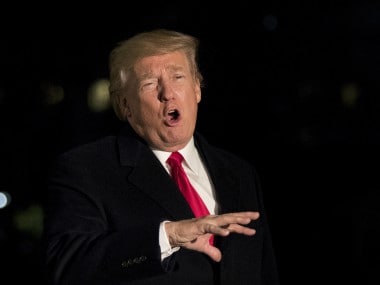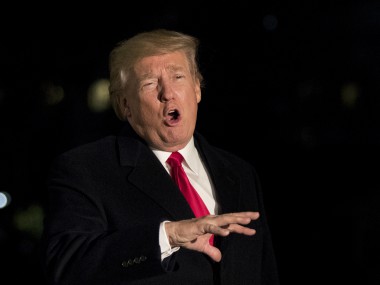President Donald Trump
made a pitch
for national unity and strong borders in his maiden State of the Union address on Tuesday, calling for “one American family” after a year plagued by acrimony, division and scandal. Delivering
his biggest speech of the year
, this most polarising of presidents sought to put the spotlight on a robust Trump economy, while pointedly calling on a packed joint session of Congress to enact hardline curbs on immigration. “Tonight, I call upon all of us to set aside our differences, to seek out common ground, and to summon the unity we need to deliver for the people we were elected to serve,” he said. [caption id=“attachment_4324499” align=“alignleft” width=“380”] File photo of US president Donald Trump. AP[/caption] Trump’s opening tone was uncharacteristically conciliatory, although it bridged no compromise on his drive to reduce immigration – which he painted as responsible for a plethora of social ills. He touched on a range of foreign policy issues – including, in an emotive moment, offering the spotlight to crippled North Korean amputee defector Ji Seong-ho, who waved a crutch in the air as he received a prolonged standing ovation. But Trump’s State of the Union, the third longest on record at one hour twenty minutes, was overwhelmingly focused on domestic concerns. Seeking to enliven his own base, Trump spoke at length on the need for immigration reform, drawing hisses from the opposition as he equated immigrants with criminality and economic tension and spoke of “chain migration.” For decades, he lamented, “open borders” had allowed “drugs and gangs to pour into” the United States. He again called for the construction of a border wall that remains unfunded in Congress. The address, often seen as a blueprint for the year to come for the United States, drew sharp reactions from global media.
File photo of US president Donald Trump. AP[/caption] Trump’s opening tone was uncharacteristically conciliatory, although it bridged no compromise on his drive to reduce immigration – which he painted as responsible for a plethora of social ills. He touched on a range of foreign policy issues – including, in an emotive moment, offering the spotlight to crippled North Korean amputee defector Ji Seong-ho, who waved a crutch in the air as he received a prolonged standing ovation. But Trump’s State of the Union, the third longest on record at one hour twenty minutes, was overwhelmingly focused on domestic concerns. Seeking to enliven his own base, Trump spoke at length on the need for immigration reform, drawing hisses from the opposition as he equated immigrants with criminality and economic tension and spoke of “chain migration.” For decades, he lamented, “open borders” had allowed “drugs and gangs to pour into” the United States. He again called for the construction of a border wall that remains unfunded in Congress. The address, often seen as a blueprint for the year to come for the United States, drew sharp reactions from global media.
A CNN op-ed warned about taking Trump’s address seriously, as it would be a ‘mistake’. “Yes, past presidents have used the annual State of the Union address as part wish list/part outline of their coming year. But Trump is not like any president that has held the office before. So we need to stop using the same old frameworks – and guideposts – to describe and measure him.”
The piece argued that best way to think about and analyse Trump as a day-to-day president, and lamenting on his address was to digress from the issues at hand. In his speech, the 71-year-old real estate mogul and reality TV star touted a long bull run on Wall Street and improving growth rates, something the White House has dubbed a “Trump bump.” “The stock market has smashed one record after another, gaining $8 trillion in value,” he said, even though that narrative suffered a setback on Tuesday when stocks suffered their biggest drop in eight months amid fears of a bubble.
The New York Times , however, argued that while Trump can sell an improved economy, he cannot sell himself to America. “The challenge for Trump is that even as he sells the economy with the fervour of a real estate developer, he has not been able to sell himself. His approval ratings remain at historic depths and effectively unchanged after a year in office. His success at passing tax cuts and the continued progress of the economy he inherited have not changed the dismal views that a sizable majority of Americans hold of their president.”
The piece pointed out that Trump’s outsize personality has so polarised the country that he may not be able to win over many converts easily, even with opportunities like a national television audience of tens of millions. Contrasting the change in his tone from his address to the Congress 11 months ago, that was warmly received, a BBC article said: “Eleven months ago, the newly inaugurated president gave a speech to Congress that was warmly received, even by some Trump critics on the left. Trump at one point pledged to put ’trivial fights behind us’. It hasn’t exactly turned out that way.” “Now the president is again preaching national unity. The question is whether a divided American public - nearly half of whom ‘strongly disapprove’ of the president - can still be converted,” the piece added. “The United States is a compassionate nation” Trump had said in his address, “but as president of the United States, my highest loyalty, my greatest compassion, and my constant concern is for America’s children, America’s struggling workers, and America’s forgotten communities.”
The Atlantic , meanwhile, pointed out how the long, surprisingly standard speech ignored the tumultuous lived reality of American politics over the past year—and the likely reality in the year to come. Faced with the challenge of presenting new proposals when many of the old ones are still on the table, Trump decided to conjure his own reality, outlining a set of some accomplishments, delivering the standard list of policy proposals, and ignoring the Russia probe altogether, the piece said.
“… Not only was the picture he painted of America removed from reality, but Trump himself was also practically unrecognisable. The speech somehow managed to render Trump the one thing he almost never is: boring,” the report said. Another Washington Post article highlighted Trump’s penchant to alter his tone to suit the occasion. It noted that a special version of the president emerges on special occasions, with his smooth, modulated voice. No shouts, no big gestures, not a mention of “radical Islamic terrorism” or “a network of lawless savages.” “The Donald Trump who delivered his first State of the Union address Tuesday night referred instead to ‘IS’. He didn’t say a word about his opponents, nothing about the critics. The man who rose to power on a wave of inflammatory rhetoric sounded as if he’d been doused with a warm glass of milk, the piece said.” With inputs from AFP
)